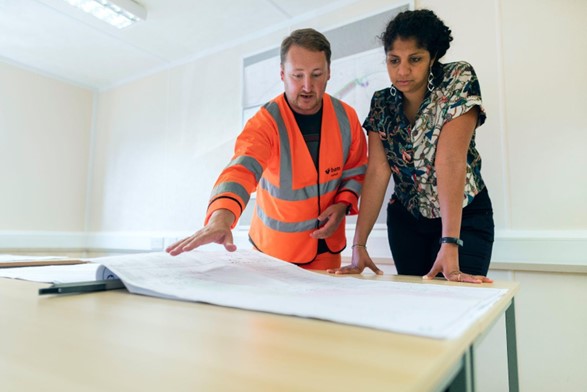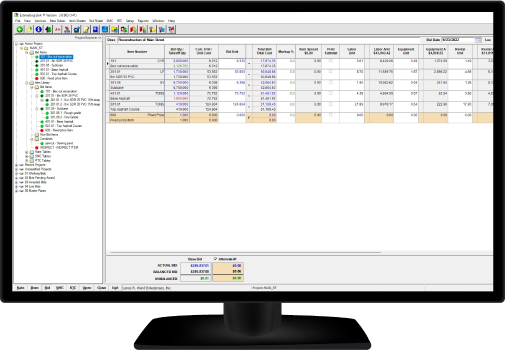
The Complete Guide to Estimating Commercial Construction Costs
Achieving accuracy in construction cost estimation for commercial projects
Estimating commercial construction costs is a critical part of business administration, where inaccuracies can significantly affect both your project’s success and your firm’s bottom line. The dynamic commercial construction sector, where projects range from expansive infrastructure to specialized facilities, demands precise cost estimates. Any misjudgment can strain your budget, cause delays, compromise project viability, and, in severe cases, jeopardize your company’s financial health.
The accuracy required to estimate commercial projects is important, and that’s something that we at TCLI understand. Below, we aim to provide you with the insights and tools necessary to approach your commercial construction projects with greater confidence and efficiency.

Key principles of commercial cost estimation
Understanding the basics
Forecasting the expenses associated with a project’s construction, or also known as cost estimation, is a vital step in construction project planning. This process encompasses the prediction of costs in every aspect of construction work, including the procurement of materials, allocation of labor, utilization of equipment, and effective site management. An estimator’s role is to compile these detailed forecasts into a comprehensive budget that reflects the project’s true scope and scale.
Estimating commercial construction costs begins with a thorough analysis of project plans and specifications, which allows estimators to clearly understand the architectural and engineering demands of the project. Estimators must then quantify the materials, labor hours, and equipment needed, applying cost rates to each to develop an overall project cost estimate.
This task requires a deep understanding of construction methods, materials pricing, labor rates, and, importantly, the interplay between these factors. Modern construction estimating software greatly aids this process, allowing for more accurate and comprehensive project cost estimates.
The importance of getting it right
The accuracy of construction cost estimates can significantly influence the success of a project and the financial well-being of the construction firm. Accurate estimates ensure the financial viability of a project and help to secure financing and investor confidence. They also provide a baseline for controlling costs throughout the project, ensuring it stays on budget and is completed profitably.
Meanwhile, inaccurate estimates can have severe consequences. Underestimating the cost of a project can lead to budget overruns, putting financial strain on contractors and jeopardizing the project’s completion. Overestimations can result in lost opportunities, as projects may appear financially unfeasible or bids may not be competitive, costing the firm potential work.
Consistently accurate estimates build a firm’s reputation for reliability and financial management, which helps win future projects. On the other hand, a track record of inaccurate construction cost estimations can damage a firm's reputation, making it harder to secure new business.
The ability to accurately estimate the cost of construction projects is a hallmark of skilled management, reflecting a deep understanding of the construction process and the ability to navigate its complexities with precision and insight.
Challenges in estimating commercial construction costs
Commercial construction cost estimation depends heavily on market dynamics and project-specific complexities. These factors require a high level of skill and adaptability from estimators, testing their ability to handle the competitive commercial construction landscape.
Understanding market dynamics
One of the biggest challenges in construction cost estimation is the fluctuating nature of material prices and labor rates. Market volatility can dramatically impact the cost environment throughout a project’s planning and execution phases. For example, an unexpected surge in the cost of key materials like steel and concrete can substantially increase overall project expenses, requiring revisions to initial estimates.
Similarly, labor rates can change based on demand and regulatory changes, further complicating the estimation process. To counteract these uncertainties, estimators must remain vigilant, incorporating contingencies and staying on top of market trends to ensure that their projects remain as accurate and resilient as possible.
Tackling project-specific complexities
Factors such as site conditions, environmental protection requirements, and logistical constraints due to location can require specialized solutions that drive up project costs. Architectural or engineering intricacies of a project can also impede an accurate cost estimate, as the need for custom-designed components or the integration of advanced technological systems can result in unexpected expenses.
Addressing these project-specific challenges requires a deep understanding of the construction process and an ability to anticipate potential issues before they arise. Effective estimators rely on their experience, detailed project cost analysis, and collaboration with architects, engineers, and contractors to identify and quantify project demands.
This kind of collaborative approach enhances the accuracy of cost estimations while ensuring that all stakeholders clearly understand the project's financial and operational elements.
The steps of effective commercial construction cost estimation
Accurate cost estimation is crucial to the success of any commercial construction project, guiding decisions from the earliest planning stages to completion. The process of estimating commercial construction costs unfolds in a series of steps, each one important to achieving a project’s financial and operational objectives.
Preliminary estimates
The construction estimating process begins with preliminary estimates, which assess the economic feasibility of a project. In this phase, estimators apply a high-level construction cost analysis to determine the expenses based on the project’s scope and scale. Estimators also take into account historical data, industry benchmarks, and initial project specifications, to help stakeholders make informed decisions on whether to advance, adjust, or halt a project based on its projected financial requirements.
Detailed estimates
As a project progresses into the design and pre-construction phases, detailed estimates are required to provide a comprehensive outline of the total expected expenses. This stage involves a thorough review of project plans, including material requirements, labor needs, equipment usage, and any special considerations or challenges that may arise.
A deep dive into these components enables estimators to develop a complete and precise budget that accurately reflects the project’s financial outlook and viability.
Bid preparation
Preparing a bid requires estimators to translate their detailed estimates into competitive and accurate bid proposals, a critical factor in a firm’s ability to win projects. This process requires a balance between competitiveness and profitability. Preparing a successful bid entails a meticulous review of project documents, an understanding of market conditions, and strategic pricing. This goal is to develop an attractive proposal that aligns with client expectations as well as with the firm’s financial interests.
Managing changes
Even with exhaustive planning, commercial construction projects often encounter changes. Whether due to design revisions, unexpected site conditions, or lack of material availability, estimators must remain flexible, adjusting their estimates to reflect these new circumstances. Effective change management relies on transparent communication, ongoing collaboration with stakeholders, and leveraging technology to update estimates quickly and rapidly. This approach ensures the project remains on track and within budget.
How construction estimating software is changing the game
Construction estimating software has changed company processes in the commercial construction sector, with solutions that enhance the precision and efficiency of project cost estimations. These programs enable estimators to evaluate project costs rapidly, taking into account materials, labor, and additional expenses with a level of accuracy that manual processes can’t match. Automating previously time-consuming tasks, construction estimating software has become an essential tool in the arsenal of today’s estimators.
A standout program is TCLI’s Estimating Link®, specifically designed for heavy construction. This software features the advanced capabilities of modern estimating tools, enabling users to manage more bids in less time while ensuring greater accuracy.

Craft more accurate bids
Estimating Link® allows estimators to cover more projects without sacrificing precision. Its Check Bid feature also scrutinizes each bid for inaccuracies, flagging any discrepancies for correction, which eliminates the common pitfalls of spreadsheet bidding and provides estimators with increased confidence. Bids made with Estimating Link® are precise and competitive by default, enabling estimators to approach bidding with increased assurance and accuracy.
Streamline commercial construction cost estimating
TCLI’s Estimating Link® centralizes estimates and resources, which allows for superior project management. Estimators can easily switch between projects, with changes saved automatically, ensuring no data is lost. This form of project management ensures that estimators can work more effectively, with every change automatically updated, preserving the integrity of project data.
The program is also flexible, functioning both as a desktop application and an online service. This versatility allows firms to choose the best setup for their operational needs, supporting estimators whether they’re working from the office or in the field.
Within Estimating Link®, the bid and item sheets provide a detailed breakdown of costs, giving estimators the tools they need for an in-depth construction cost analysis at each project phase. These features enable informed decision-making, which helps in calculating optimal bid units, and facilitating last-minute bid adjustments. As a result, estimators can quickly revise their bids to align with current project specifications, making their proposals both precise and competitive.
Enhance collaboration and adaptability
One of Estimating Link®’s key strengths is its capability to support teamwork by allowing multiple estimators to utilize the program simultaneously. This feature significantly boosts collaboration, enabling teams to distribute tasks efficiently and enhancing the quality of their proposal preparations. With real-time updates, team members can always access the latest project information, improving coordination and overall bid quality.
The software also simplifies project management processes by enabling the reuse of task data and the ability to duplicate entire projects or specific elements for new estimates. Estimating Link®’s integration with DOT systems and spreadsheet programs makes working with external platforms straightforward, showcasing the program’s versatility and ability to meet a wide variety of project demands.
Take your construction estimating to the next level
Enhance your approach to construction estimating with Estimating Link®. Discover the advantages by requesting a free trial today and watch a detailed video overview to understand how TCLI’s construction estimating software can transform your bidding process.
The importance of continuous learning in construction cost estimation
In the fast-paced and competitive commercial construction industry, staying informed and adaptable is key to any firm’s success. As new technologies emerge and market dynamics shift, construction professionals must commit to ongoing learning to sharpen their skills and expand their knowledge.
TCLI is committed to supporting this professional growth by providing multiple training resources. These offerings are designed to ensure that users are proficient with the latest functionalities of our software and are on top of recent advancements within the industry. Our goal is to empower your success, which is why we've structured a comprehensive three-phase approach for maximizing the benefits of our software.
This strategy starts with implementation, setting up our software to integrate with your firm's operations. We then provide detailed training for your team, available virtually or in person, so your team knows how to use our tools. The final phase is continuing education, where we remain at your disposal for any inquiries via phone or email. We also provide the Knowledge Link online library, a treasure trove of articles, webinars, video tutorials, and a wealth of tips and best practices.
Parting advice on estimating commercial construction costs
Enhancing precision, streamlining processes, and fostering collaboration in estimating commercial construction costs are essential in today’s competitive market.
With the construction industry constantly advancing, adopting tools and technologies to refine cost estimation practices becomes imperative.
Enhancing your approach to construction cost estimation is straightforward with Estimating Link®, Learn more by visiting our product page or reaching out to us directly for any queries. Explore our blogs for a wide range of topics related to construction estimation, providing you with the knowledge to thrive in the industry.





